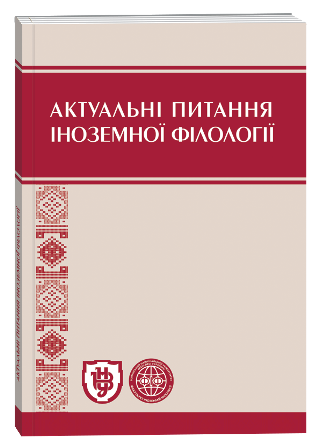PROFESSIONAL DISCOURSE: SEMIOTIC AND COGNITIVE APPROACHES
DOI:
https://doi.org/10.32782/2410-0927-2024-21-13Keywords:
professional discourse, institutional discourse, professional consciousness, cognitive linguistics, professional communication, semioticsAbstract
The relevance of this paper is due to the crucial role of professional discourse in professional socialization, which is the process through which individuals acquire professional knowledge, skills and relationships necessary for effective activity in profession. The aim of this research is to examine and analyze professional discourse within the framework of semiotic and cognitive approaches, employing methods of observation and analysis. The paper provides a definition of professional discourse and outlines its general characteristics, analyzed in the context of extralinguistic environment and social factors. It is concluded that professional discourse crosses with scientific discourse, workplace discourse and institutional (status-oriented) discourse, as well as other types of discourse associated with professional activity. Professional discourse is characterized by clear goals and takes place in professional situations regulated by participants, location and communicative events. Professional discourse exhibits an expert nature, reflected in terminology, text genres and communication patterns that vary according to the subject area. The specifics of professional discourse lies in its dependence on diverse social frame systems such as legal-social, technical-economic, socio-cultural and linguistic systems. A distinctive feature of professional discourse is its dynamic nature, evident in the evolving requirements for professional communication skills at different stages, the rapid changes in the labour market and political landscape, and the increasing globalization of the economy. Professional discourse encompasses a corpus of texts and conversations unified by a shared professional worldview, vocabulary, themes and genres, along with extralinguistic factors determined by the individual professional activity. Each type of professional discourse imposes specific linguistic norms on communication. Cognitive mechanisms such as metaphor and metonymy play a crucial role in developing professional discourse. Fundamental concepts, metaphorical frameworks and types of metonymic transfer contribute to the distinctiveness and specificity of each professional discourse. The symbolic (semiotic) nature of professional discourse on the metalingual level is manifested in the use of language for specific purposes, predominantly characterized by specialized terminology.
References
Дробот О. В. Психосемантичні особливості професійної свідомості майбутніх менеджерів : дис. ... канд. психол. наук : 19.00.01. Київ, 2009. 238 с.
Колеснікова І.А. Діалектика номінального та узуального у професійному дискурсі. Київ: КНЕУ, 2008. 246 с.
Кузнєцова Г.В. Політичний дискурс vs професійний дискурс. Когнітивно прагматичні дослідження професійних дискурсів: матеріали VI наукової конференції з міжнародною участю, 17 Березня 2018 р. Харків, 2018. С. 51–53.
Морозова І.І. Професійний жіночий дискурс: історико-прагматичний аспект. Когнітивно прагматичні дослідження професійних дискурсів: матеріали VI наукової конференції з міжнародною участю, 17 Березня 2018 р. Харків, 2018. С. 69–70
Самойлова А. Г. Особливості формування професійної свідомості майбутніх психологів : дис. ... канд. психол. наук : 19.00.07. Київ, 2005. 208 с
Сошинська В. Основні канали професійної комунікації в документноінформаційній сфері. Вісник Книжкової палати. 2006. № 9. С. 30–32.
Barthes R. Le Système De La Mode: Essais De Sémiologie De La Culture. Editions du Seuil, 1967. 327 p.
Burkhardt A. Der deutsche Fußball und seine Sprache. Nebst Kurzporträt eines Wörterbuchprojekts, 2011. URL: http:// www.dirk-kemper.de (дата звернення: 24.11.2024).
Foucault M. L’ordre du discourse. Paris: Gallimard, 1971. 81 p.
Greimas A. J., Courtes J. Semiotics and Language: An Analytical Dictionary. Bloomington: Indiana University Press, 1979.
Gunnarsson B. L. Professional Discourse. London: Bloomsbury Publishing, 2009. 275 p.
Gunnarsson B.-L., Linell P., Nordberg B. (Eds.). The construction of professional discourse. London and New York: Longman, 1997. 328 p.
Irimiea S.B. Professional Discourse as Social Practice. European Journal of Interdisciplinary Studies. 2017. Vol. 9. № 1. URL: http:// journals.euser.org/files/articles/ejis_sep_dec_17/Silvia.pdf (дата звернення: 24.11.2024).
Peirce Ch.S. Logical Foundations of the Theory of Signs. Harvard University Press: Dover publications Inc, 1958.
Turner M., Fauconnier G. Conceptual integration and formal expression. Metaphor and Symbolic Activity. 1995. Vol. 10. № 3. P. 183–204.
van Dijk T.A. Introduction: Discourse analysis as a new cross-discipline. London: Academic Press, 1985.







